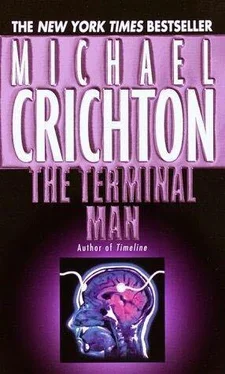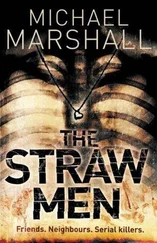Michael Crichton - The Terminal Man
Здесь есть возможность читать онлайн «Michael Crichton - The Terminal Man» весь текст электронной книги совершенно бесплатно (целиком полную версию без сокращений). В некоторых случаях можно слушать аудио, скачать через торрент в формате fb2 и присутствует краткое содержание. Жанр: Фантастика и фэнтези, на английском языке. Описание произведения, (предисловие) а так же отзывы посетителей доступны на портале библиотеки ЛибКат.
- Название:The Terminal Man
- Автор:
- Жанр:
- Год:неизвестен
- ISBN:нет данных
- Рейтинг книги:3 / 5. Голосов: 1
-
Избранное:Добавить в избранное
- Отзывы:
-
Ваша оценка:
- 60
- 1
- 2
- 3
- 4
- 5
The Terminal Man: краткое содержание, описание и аннотация
Предлагаем к чтению аннотацию, описание, краткое содержание или предисловие (зависит от того, что написал сам автор книги «The Terminal Man»). Если вы не нашли необходимую информацию о книге — напишите в комментариях, мы постараемся отыскать её.
The Terminal Man — читать онлайн бесплатно полную книгу (весь текст) целиком
Ниже представлен текст книги, разбитый по страницам. Система сохранения места последней прочитанной страницы, позволяет с удобством читать онлайн бесплатно книгу «The Terminal Man», без необходимости каждый раз заново искать на чём Вы остановились. Поставьте закладку, и сможете в любой момент перейти на страницу, на которой закончили чтение.
Интервал:
Закладка:
"Well, it is. But we get the job done, I can tell you that." He pointed across the room. "That's Harry's desk, next to Hap."
"Hap?"
Farley gestured to a large, spidery metal construction across the room. "Hap," he said, "is short for Hopelessly Automatic Ping-pong Player." He grinned. "Not really," he said. "But we have our little jokes here."
Morris walked over to the machine, circled around it, staring. "It plays ping-pong?"
"Not well," Farley admitted. "But we're working on that. It's a DOD - Department of Defense- grant, and the terms of the grant were to devise a ping-pong-playing robot. I know what you're thinking. You're thinking it isn't an important project."
Morris shrugged. He didn't like being told what he was thinking all the time.
Farley smiled. "God knows what they want it for," he said.
"Of course, the capability would be striking. Imagine - a computer that could recognize a sphere moving rapidly through three-dimensional space, with the ability to contact the sphere and knock it back according to certain rules. Must land between the white lines, not off the table, and so on. I doubt," he said, "that they'll use it for ping-pong tournaments."
He went to the back of the room and opened a refrigerator which had a big orange RADIATION sign on it, and beneath, AUTHORIZED PERSONNEL ONLY. He removed two jars. "Want some coffee?"
Morris was staring at the signs.
"That's just to discourage the secretaries," Farley said, and laughed again. His jovial mood bothered Morris. He watched as Farley made intant coffee.
Morris went over to Benson's desk and began checking the drawers.
"What is it about Harry, anyway?"
"How do you mean?" Morris asked. The top drawer contained supplies - paper, pencils, slide rule, scribbled notes and calculations. The second drawer was a file drawer; it seemed to hold mostly letters.
"Well, he was in the hospital, wasn't he?"
"Yes. He had an operation, and left. We're trying to find him now."
"He's certainly gotten strange," Farley said.
"Uh-huh," Morris said. He was thumbing through the files. Business letters, business letters, requisition forms…
"I remember when it began," Farley said. "It was during
Watershed Week."
Morris looked up from the letters. "During what?"
"Watershed Week," Farley said. "How do you take your coffee?"
"Black."
Farley gave him a cup, stirred artificial cream into his own. "Watershed Week," he said, "was a week in July of 1969. You've probably never heard of it."
Morris shook his head.
"That wasn't an official title," Farley said, "but that was what we called it. Everybody in our business knew it was coming, you see."
"What was coming?"
"The Watershed. Computer scientists all over the world knew it was coming, and they watched for it. It happened in July of 1969. The information-handling capacity of all the computers in the world exceeded the information-handling capacity of all the human brains in the world. Computers could receive and store more information than the 3.5 billion human brains in the world."
"That's the Watershed?"
"You bet it is," Farley said.
Morris sipped the coffee. It burned his tongue, but he woke up a little. "Is that a joke?"
"Hell, no," Farley said. "It's true. The Watershed was passed in 1969, and computers have been steadily pulling ahead since then. By 1975, they'll lead human beings by fifty to one in terms of capacity." He paused. "Harry was awfully upset about that."
"I can imagine," Morris said.
"And that was when it began for him. He got very strange, very secretive."
Morris looked around the room, at the large pieces of computer equipment standing in different areas. It was an odd sensation: the first time he could recall being in a room littered with computers. He realized that he had made some mistakes about Benson. He had assumed that Benson was pretty much like everyone else - but no one who worked in a place such as this was like everyone else. The experience must change you. He remembered that Ross had once said that it was a liberal myth that everybody was fundamentally the same.
Lots of people weren't. They weren't like everybody else.
Farley was different, too, he thought. In another situation, he would have dismissed Farley as a jovial clown. But he was obviously bright as hell. Where did that grinning, comic manner come from?
"You know how fast this is moving?" Farley said. "Damned fast. We've gone from milliseconds to nanoseconds in just a few years. When the computer ILLIAC I was built in 1952, it could do eleven thousand arithmetical operations a second.
Pretty fast, right? Well, they're almost finished with ILLIAC IV now. It will do two hundred million operations a second. It's the fourth generation. Of course, it couldn't have been built without the help of other computers. They used two other computers full time for two years, designing the new ILLIAC."
Morris drank his coffee. Perhaps it was his fatigue, perhaps the spookiness of the room, but he was beginning to feel some kinship with Benson. Computers to design computers - maybe they were taking over, after all. What would Ross say about that? A shared delusion?
"Find anything interesting in his desk?"
"No," Morris said. He sat down in the chair behind the desk and looked around the room. He was trying to act like
Benson, to think like Benson, to be Benson.
"How did he spend his time?"
"I don't know," Farley said, sitting on another desk across the room. "He got pretty distant and withdrawn the last few months. I know he had some trouble with the law. And I knew he was going into the hospital. I knew that. He didn't like your hospital much."
"How is that?" Morris asked, not very interested. It wasn't surprising that Benson was hostile to the hospital. Farley didn't answer. Instead, he went over to a bulletin board, where clippings and photos had been tacked up. He removed one yellowing newspaper item and gave it to Morris.
It was from the Los Angeles Times, dated July 17, 1969.
The headline read: UNIVERSITY HOSPITAL GETS NEW COMPUTER. The story outlined the acquisition of the IBM System 360 computer which was being installed in the hospital basement, and would be used for research, assistance in operations, and a variety of other functions.
"You notice the date?" Farley said. "Watershed Week."
Morris stared at it and frowned.
"I am trying to be logical, Dr. Ross."
"I understand, Harry."
"I think it's important to be logical and rational when we discuss these things, don't you?"
"Yes, I do."
She sat in the room and watched the reels of the tape recorder spin. Across from her, Ellis sat back in a chair, eyes closed, cigarette burning in his fingers. Morris drank another cup of coffee as he listened. She was making a list of what they knew, trying to decide what their next step should be.
The tape spun on.
"I classify things according to what I call trends to be opposed," Benson said. "There are four important trends to be opposed. Do you want to hear them?"
"Yes, of course."
"Do you really?"
"Yes, really."
"Well, trend number one is the generality of the computer. The computer is a machine but it's not like any machine in human history. Other machines have a specific function - like cars, or refrigerators, or dishwashers. We expect machines to have specific functions. But computers don't. They can do all sorts of things."
"Surely computers are- "
"Please let me finish. Trend number two is the autonomy of the computer. In the old days, computers weren't autonomous. They were like adding machines; you had to be there all the time, punching buttons, to make them work. Like cars: cars won't drive without drivers. But now things are different.
Читать дальшеИнтервал:
Закладка:
Похожие книги на «The Terminal Man»
Представляем Вашему вниманию похожие книги на «The Terminal Man» списком для выбора. Мы отобрали схожую по названию и смыслу литературу в надежде предоставить читателям больше вариантов отыскать новые, интересные, ещё непрочитанные произведения.
Обсуждение, отзывы о книге «The Terminal Man» и просто собственные мнения читателей. Оставьте ваши комментарии, напишите, что Вы думаете о произведении, его смысле или главных героях. Укажите что конкретно понравилось, а что нет, и почему Вы так считаете.









